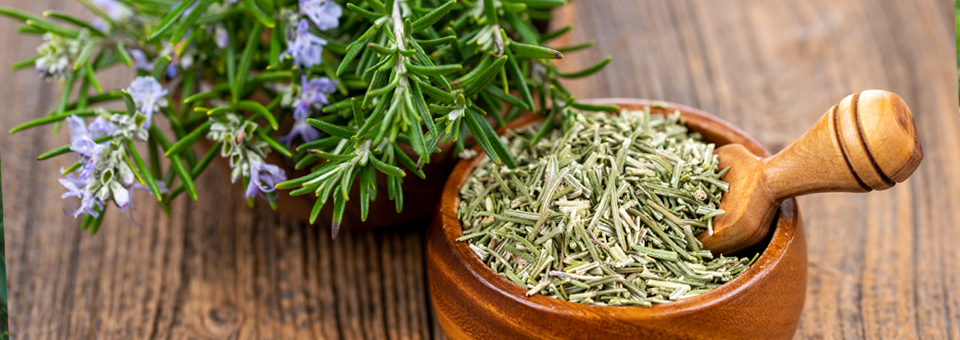There’s an old legend that says if you smell rosemary on Christmas Eve, it will bring happiness in the New Year.
But I try to use it all year long… not just for its incredible aroma and flavor, but because it has amazing health benefits.
Especially when it comes to the brain.
Studies prove that this culinary herb can improve memory,1 ease anxiety and depression2 – and most notably, protect against Alzheimer’s and dementia by preventing the death of brain cells.3
You see, rosemary is a rich source of luteolin. And this powerful antioxidant protects a special kind of cell in your brain called “glial cells” from free radical damage and inflammation.
For decades, scientists thought these glial cells were just support for the neurons that did the real work of “thinking.” But now we are learning that they do much more.
Most importantly, these brain cells stimulate and fine tune the actions of your neurons. This gives you a faster, more accurate brain. You get less fogginess and better concentration.
For example, if you were missing a kind of glial cell called oligodendrocytes, messages would travel through your brain 30 timers slower!
Other glial cells clear out toxic waste from your brain every night.4 While you sleep, neurons shrink by as much as 60%.
And in a study published in Stem Cell Reports, researchers found that there’s a specific kind of glial cell called an astrocyte. This cell produces more beta amyloid – a biomarker of Alzheimer’s – in people with the disease.5
To put it simply, healthy glial cells could be the key to a healthier brain as you age.
But rosemary does much more than help your brain health. It also:
✓ Increases your immune defense shield
✓ Improves circulation
✓ Reduces joint inflammation
✓ Eases digestion
✓ Fights bacterial infection
✓ Boosts alertness AND promotes sleep
✓ Protects skin cells from free radical damage
✓ Promotes hair growth
I use rosemary to season my holiday turkey … but it’s not your only good source of luteolin.
In addition to this herb, my top picks for foods rich in this flavonoid include celery, parsley, citrus fruits, green peppers, artichoke and basil. Aim to get at least one serving at each meal.
It can be hard to get enough luteolin through food alone, but you can supplement. Luteolin is available as a powder, pill or chewable tablet. I recommend taking 8 mg to 10 mg daily.
Or you can always enjoy rosemary the way my grandmother did. She’d go to her garden and pick a few sprigs to make a restorative tea…
Fragrant Rosemary Tea

The same herb that boosts memory and brain alertness can also improve sleep and reduce insomnia. It’s easy to make a quick before-bed tea using fresh rosemary.
✓ 1 cup boiled water
✓ 2 sprigs fresh rosemary
✓ 1 tablespoon organic honey
✓ Juice from 1 fresh lemon
- Boil water then pour it over the chicory root and cinnamon stick.
- Steep for 3-5 minutes.
- Remove the tea and cinnamon stick. Pour tea into a blender
with coconut oil and blend on high for 30 seconds. Then serve and enjoy!
To Your Good Health,

Al Sears, MD, CNS
1. British Psychological Society. “Rosemary aroma can aid children’s working memory: Exposure to the aroma of rosemary essential oil can significantly enhance working memory in children.” ScienceDaily. ScienceDaily, 2 May 2017.
2. Iatrou G, et al. “Rosemary tea consumption results to anxiolytic- and anti-depressant-like behavior of adult male mice and inhibits all cerebral area and liver cholinesterase activity; phytochemical investigation and in silico studies.” Chem Biol Interact. 2015 Jul 25;237:47-57.
3. Habtemariam S. “The therapeutic potential of rosemary (Rosmarinus officinalis) diterpenes for Alzheimer’s Disease.” Evid Based Complement Alternat Med. 2016; 2016: 2680409.
4. Jeffrey J, et al. “A paravascular pathway facilitates CSF flow through the brain parenchyma and the clearance of interstitial solutes, including amyloid β.” Sci Transl Med. 2012;4(147):147ra11.
5. Oksanen M, et al. PSEN1 mutant iPSC-derived model reveals severe astrocyte pathology in Alzheimer’s Disease.” Stem Cell Reports. 2017 Dec 12;9(6):1885-1897. doi: 10.1016/j.stemcr.2017.10.016.

